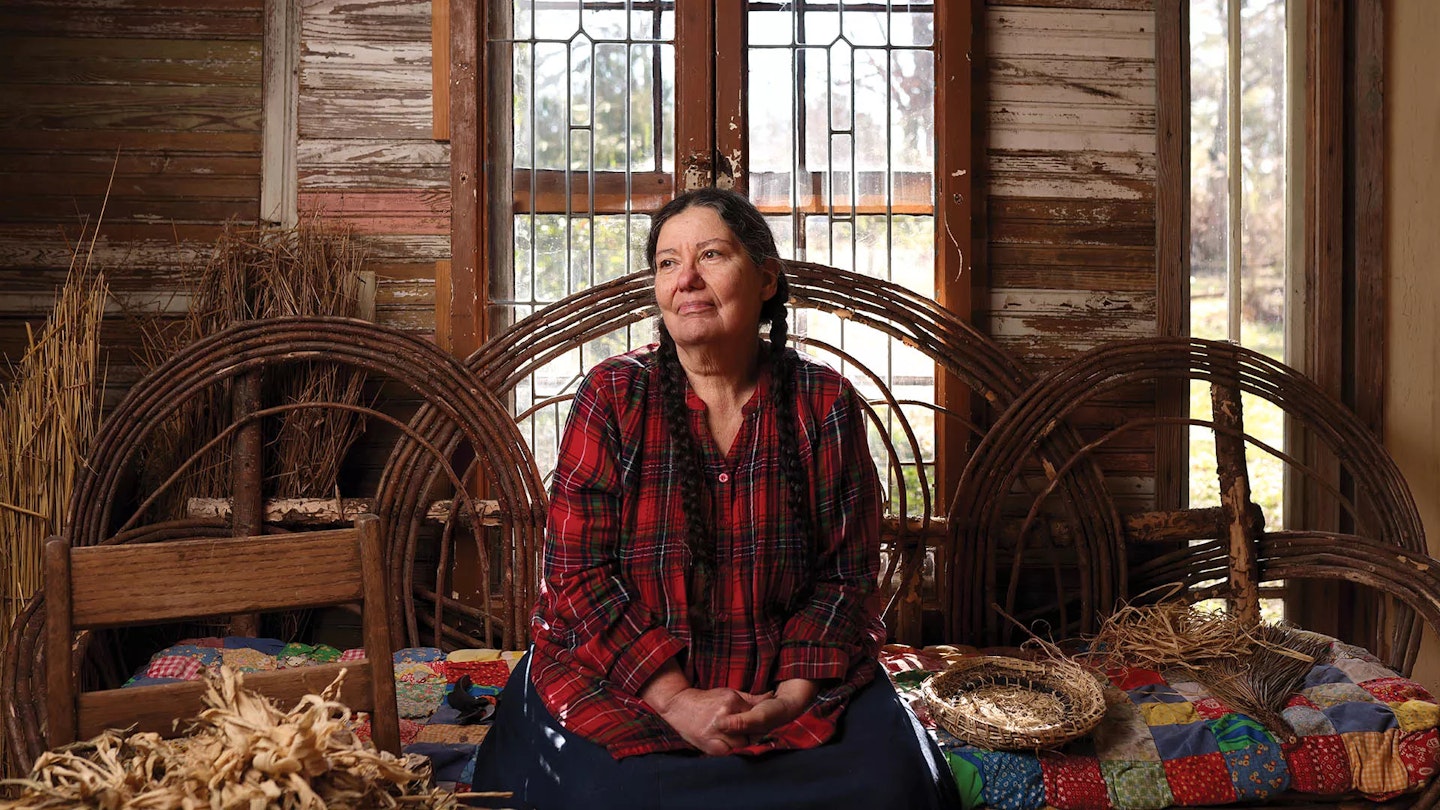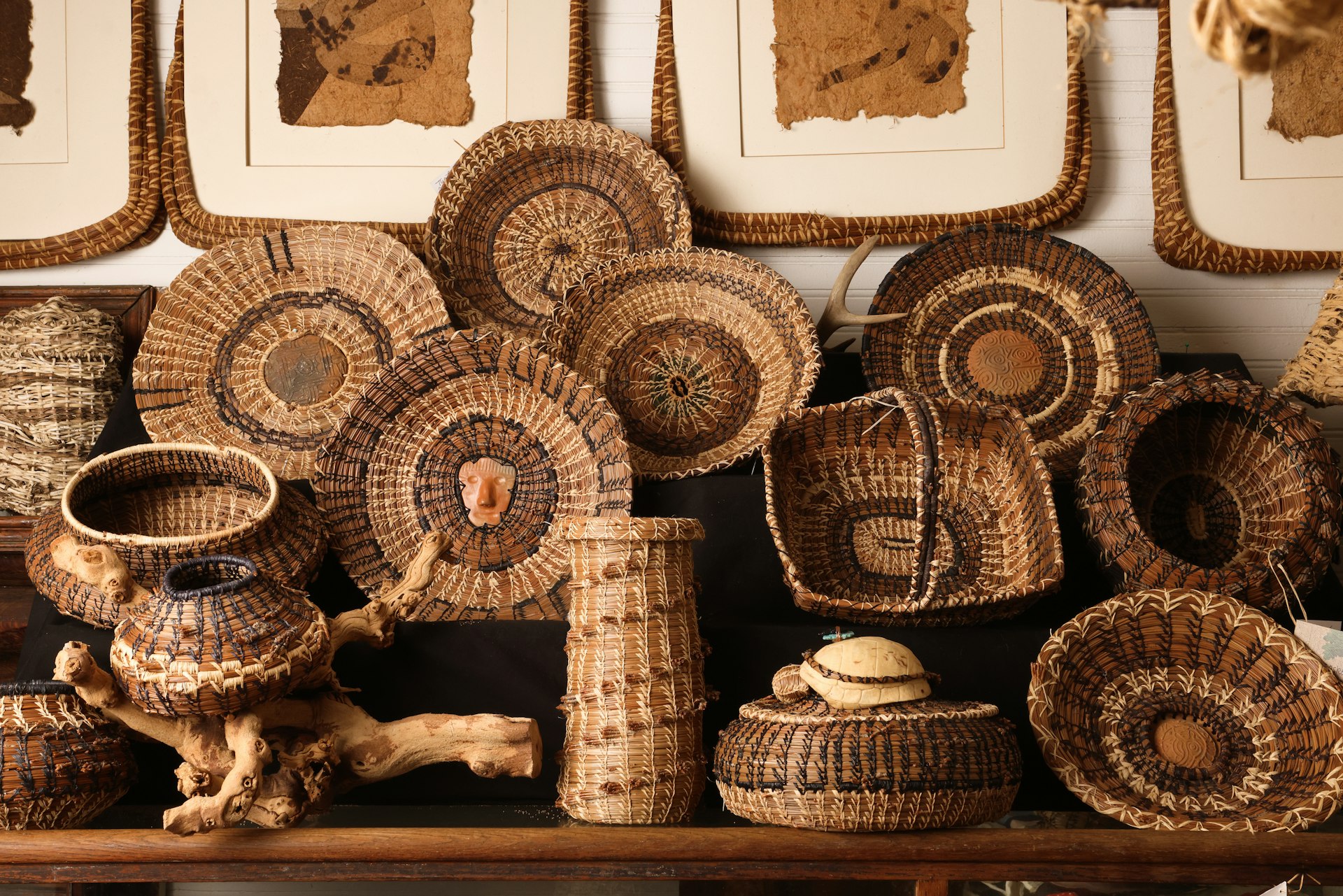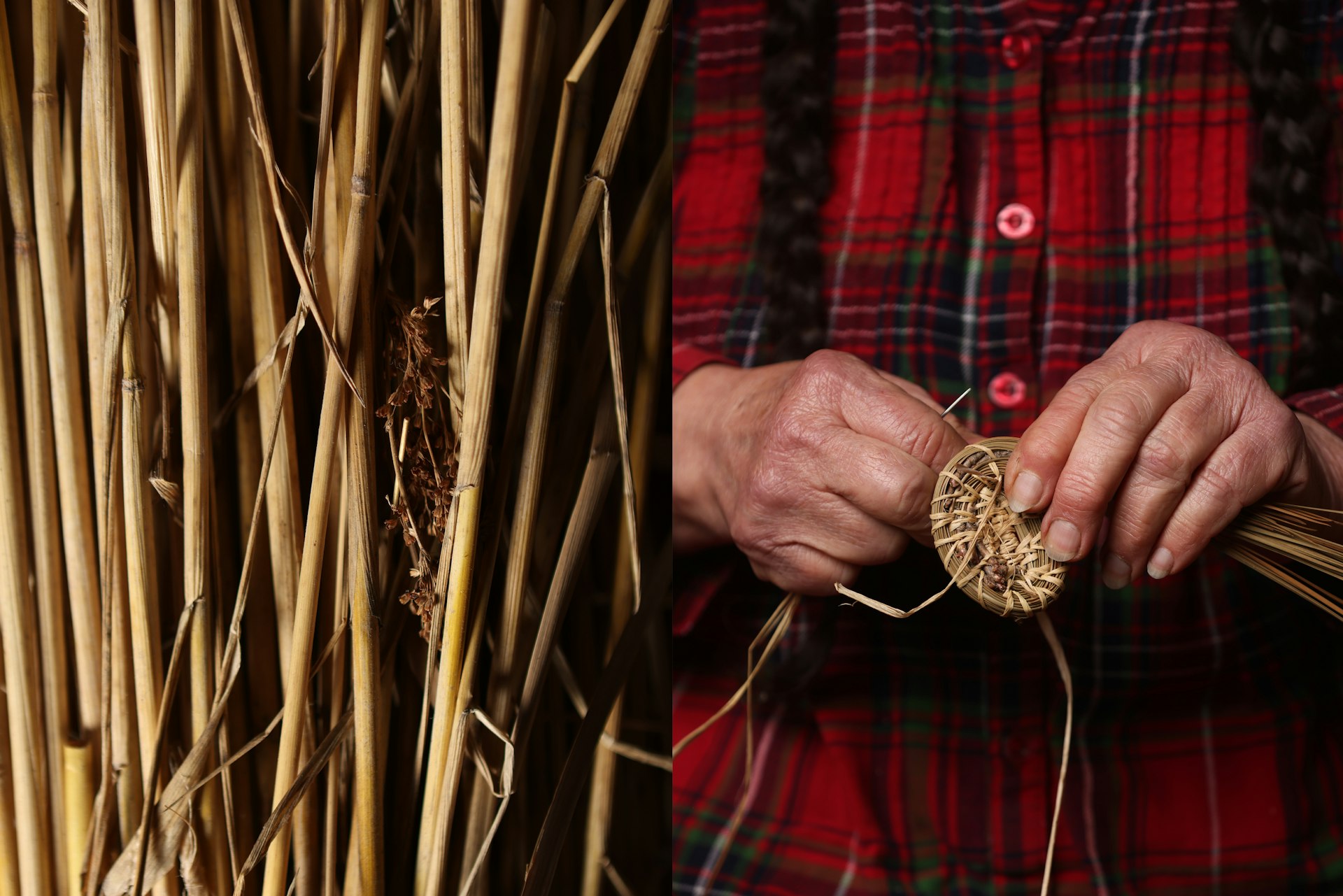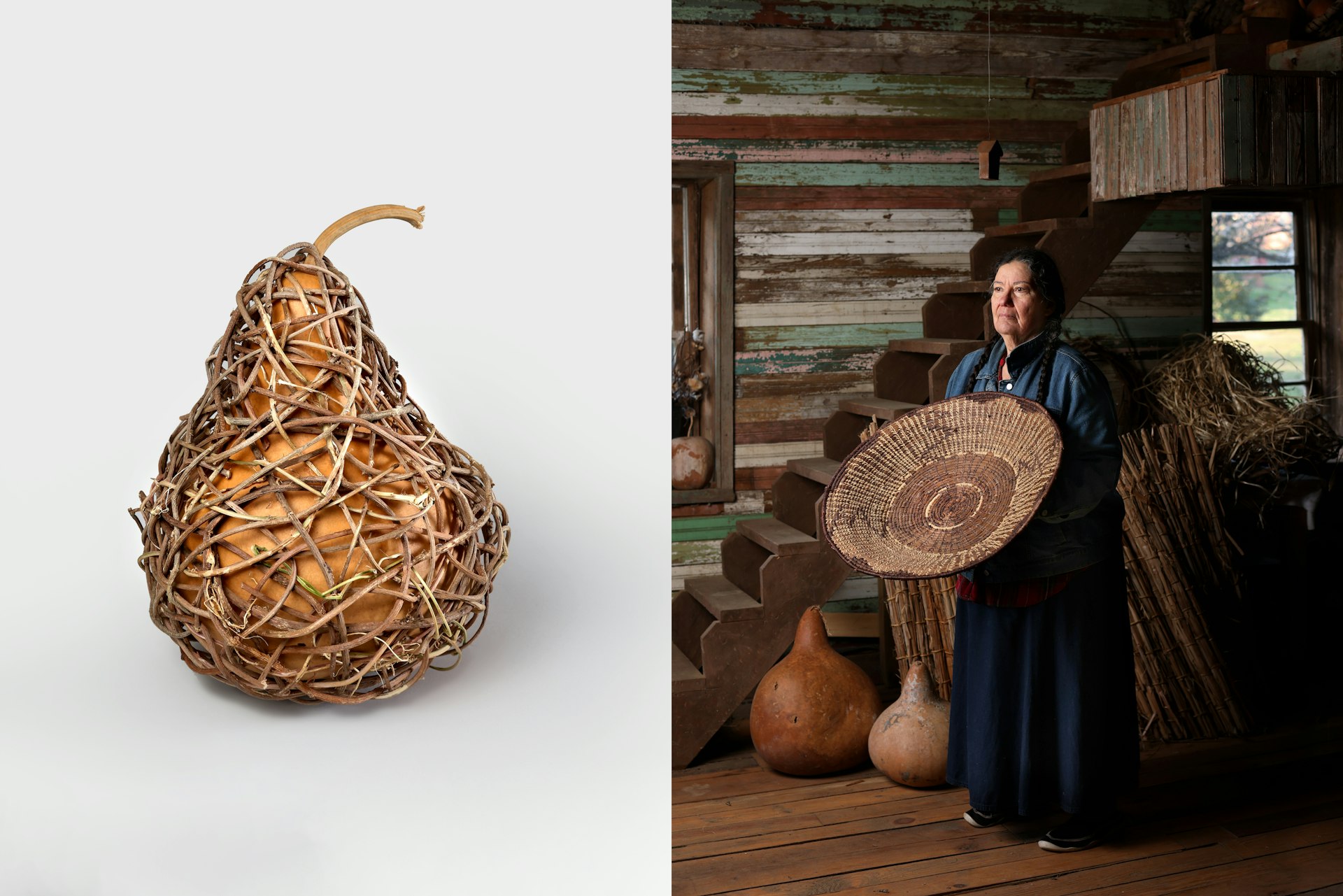October 27, 2023
Nancy Basket: Walhalla’s Kudzu Master on the Intergenerational Power of Basket Making

As a child of the South, kudzu overgrowths gracefully lended themselves to my wandering imagination. In Charlotte, North Carolina, along the historic Billy Graham Road, stands 20 foot drapes of coiling kudzu leaves. Domed high near the treetops, leaves fall low on its sides and stretch far on its left end. Like a herculean creature before its beautiful defeat, whatever lies beneath lives on.
Growing a foot a day, this winding perennial vine engulfs everything in its path. Overtaking abandoned cars, telephone poles and even homes, kudzu is a masterful force of nature that refuses to be ignored. Known as “the vine that ate the South”, this creeping ivy is native to Japan and Southeast China. First introduced to the United States at the 1876 Philadelphia Centennial Exposition, kudzu was sought for its ornamental, violet blooms, and potential to curb soil erosion. Little did they know in 1876 that kudzu would soon be growing out of control.
For makers like Nancy Basket of Walhalla, SC, kudzu is no stranger to her backyard. I spoke with the master basket maker. Together we leaned into the world of indigenous basketry, and I heard her hopes for the next generation of kudzu weavers.
Baskets by Nancy Basket
Nancy Baskets was born in the Northwest coast of Washington state. As a descendant of Cherokee woman, Margaret Basket, Nancy was keen on learning the indigenous art of basketry. At age 29, she found a woman in her 60’s named Vi Phillips who changed the trajectory of her life in basketry. Along with Vi, Nancy and 5 others would meet once a month to learn different native methods of basketry. For Nancy, the power of community is everything.
“We wanted to learn more: the different kinds of materials like horsehair, pine needle, and corn husks. I’ve learned to make baskets of all kinds. I make miniature baskets (1 foot= 1 inch), and have mastered them as small as my fingernail. Now, looking back, I’ve been making baskets for almost 40 wonderful years.”
Currently an art educator in South Carolina, Nancy has worked in public schools for more than 30 years teaching Lowcountry youth to connect with nature through basketry. Using what others call “invasives” to make baskets, she prefers to call kudzu pervasive. “Words have power. Nothing on earth is invasive, but no one likes kudzu but me (and a few other people I’ve met through the years).” Making a living off her mastery, Nancy has used the kudzu overgrowths in the Walhalla grasslands to make her art. Throughout her 30 years, she’s found that the biodiversity we live and breathe amongst can be turned into art.
“I’ve used what grows in my backyard to make my art. A lot of things in your backyard can be turned into all kinds of baskets. These techniques I have learned throughout the years are history that I hold. That's why I love my work so much. My connection with people and plants.”
Nancy’s love for kudzu has brought her to overgrowths across the Carolina’s. In the ancestral lands of the Cherokee, the town is covered in kudzu. Similar to the mystical scenes on Billy Graham Road, Nancy describes the view as something out of a fairytale. “If you haven't seen it lately, you wouldn't believe it! It's almost like Sleeping Beauty with the vine coiling all over.” Where kudzu is seen as the annoyance of Southern horticulture, Nancy sees an opportunity.
She tells me of a quote from Dr. Michael Abrams that I’ve grown to love. It goes: Even tradition has its first day on the job.
Nancy Basket weaving with kudzu.
There’s a humor and a lightness to Nancy. She is a woman as wistful as the nature she intends to preserve. Though she presumes a “cup-half-full” mentality on life, she is concerned about the future of this tradition she holds so close to her heart. Across the country, the indigenous traditions of basket making are at risk of extinction. With elders aging out of the practice and industry reliance on imported materials, it is more important than ever that this ancestral knowledge is passed down, even if some traditions have to be altered.
“Not all of us that are older have the hands to forage natural materials anymore. Urban development is making it harder for certain vines to grow. There’s a lot of change, but that's where kudzu comes in. Let’s put it to work. Traditions change. So we have to have the younger kids involved. Even young people in their 20s, 30s, and 40s: we have to start somewhere.”
Basketry is a labor of love that has spanned millennia across the globe. The ancestral knowledge shared with Nancy when she was 29 years old has changed to fit the artistic and environmental challenges of today. The tradition has evolved, and as a result the communities have diversified. A kudzu maker Nancy has been keeping her eye on: Delia Turner, of Murphy, NC. A resident of the John C. Campbell Folk School, Delia realizes the significance of this tradition's sustainability. She says, “For tradition to continue, it needs to be accessible, easy, and relevant.” Much like Nancy, this philosophy is what drives Delia’s passion for teaching and expanding community.
Nancy Basket with her artworks.
Nancy has been a community member of Earth Skills for more than 30 years, and has since started a Basket Guild in South Carolina, where younger people are invited to be makers. For Nancy, the youths' physical abilities, creative minds, and environmental passions are the perfect catalyst to kickstart a new era in basket making. She is even hoping to create an accredited course for high schoolers to sweeten the deal!
Being a host artist with Vacation With An Artist, Nancy says, “This is what it’s all about.” She is a pillar of Walhalla artistry, sharing intergenerational knowledge with all who will listen. “There are others that have taken classes with me that now teach basketry. That's how you leave something behind! So I feel hopeful that we will be here another 100 years down the road.” Changing the perception of kudzu one baskets guild meeting at a time, Nancy is on the front lines of defense. Having built an ecosystem of love for kudzu and a community across the Southeast, the legacy of Nancy Basket is as herculean as the kudzu vines that cover the Lowcountry. Her wisdom will live on.
Written by Tyler Pharr
Explore all mini-apprenticeships, and be sure to come say hey on Instagram. For more stories, tips, and new artist updates, subscribe here.


